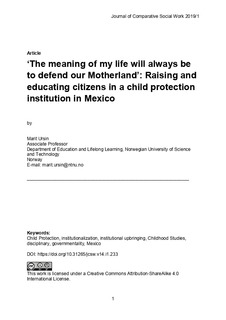‘The meaning of my life will always be to defend our Motherland’: Raising and educating citizens in a child protection institution in Mexico
Journal article, Peer reviewed
Published version

Åpne
Permanent lenke
http://hdl.handle.net/11250/2597976Utgivelsesdato
2019Metadata
Vis full innførselSamlinger
Originalversjon
Journal of Comparative Social Work. 2019, 1 1-28. https://doi.org/10.31265/jcsw.v14i1.233Sammendrag
The point of departure of this paper is that childhood is socially constructed and continuously re-defined through public policies, laws, practices and ideologies. The paper explores the perspectives on children, upbringing and socialization as reflected in the manuals, forms and questionnaires of social workers in a child protection institution in Mexico. It employs a theoretical lens borrowed from Childhood Studies, using three dominant images of childhood—the Dionysian, Apollonian and Athenian—to examine the links between discursive constructions of childhood and ways of governing institutionalized children. Four overarching themes were identified as representative of predominant concepts of values concerning children and child rearing in an institutionalized context in the documents: (1) Patriotism, (2) Work ethics, (3) Hygiene, and (4) Physical experiences and sexuality. The analysis reveals how children are perceived primarily as future citizens, with their upbringing being a part of a wider nation-building project. Hence, there is an emphasis on how to become a ‘decent’ labourer, internalize the values of- and loyalty to the nation-state, and develop into a ‘moral’ and ‘civilized’ citizen. It is argued that institutional socialization is part and parcel of a political ideology that reinforces the idea of children as relatively passive socialization objects.
